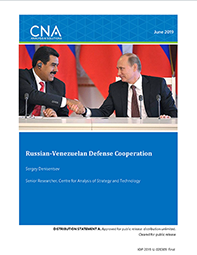The following preview shows the first excerpt of this document:
Pre-Chavez Defense Market in Venezuela
In the pre-Chavez period, neither the Soviet Union nor, later, Russia had any tangible presence in the Venezuelan defense market. During the Soviet period, that was mainly because of the generally poor state of Soviet-Venezuelan relations: during the Cold War, Caracas pursued a pro-Western course and actively suppressed Communist parties and movements. In the 1990s, arms trade between the two countries was held back by economic rather than political considerations. Both economies were struggling; Venezuela could not afford to spend much on new arms contracts, and Russia was not in a state to offer credit financing to its defense customers.
The Venezuela defense market was dominated by Western suppliers. Between the end of World War II and the election of Carlos Andrés Pérez as Venezuela’s president in 1974, the United States controlled over a third of that market. Britain and Canada also maintained a strong presence. That changed after the election of President Pérez. The new administration pursued different foreign-policy priorities and favored different suppliers, awarding fewer contracts to the Americans and more to European suppliers (especially from Italy, France, and Germany, as shown in Figure 1).
Download reportDISTRIBUTION STATEMENT A. Approved for public release: distribution unlimited.
Details
- Pages: 40
- Document Number: IOP-2019-U-020309-Final
- Publication Date: 6/5/2019
